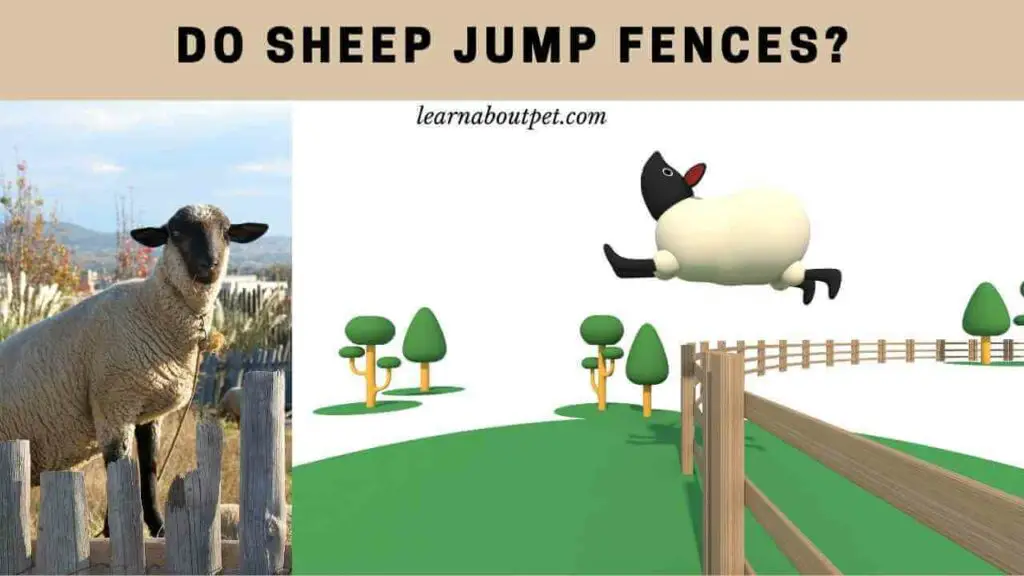One of the most frequently asked questions about sheep is as to whether they are capable of jumping fences. Sometimes, the people posing this question will be folks who are considering starting to keep sheep. Others are people who have kept sheep for a while, and have started noticing jumping behaviors – which make them wonder whether sheep are capable of jumping fences.
Do sheep jump fences? Yes, sheep have the ability to jump fences. It is not something they routinely do though. But it is something they are capable of doing. In most cases where sheep manage to jump over fences, it turns out that the fences are either too short or damaged. Sagging fences are also fair game for sheep. In most cases though, sheep are unable to jump over a fence that is higher than 48 inches (4 feet).

Read on, to find out whether sheep can jump fences (and if they can, what you need to do about it).
Can Sheep Jump Over Fences?
Sheep are capable of jumping over fences. Sometimes, they may jump over fences just to explore the world outside. At other times, you may find that the conditions inside the enclosure are not good. So the sheep in such cases essentially jump to escape. We also have cases where sheep jump over fences in order to be with other sheep that happen to be on the ‘other side’.
This, of course, is not to say that sheep are capable of jumping over all types of fences. If a fence is high enough and strong enough, sheep won’t be able to jump over it. In most cases, for a fence to be capable of being jumped over by sheep, it needs to be either too short or damaged.
By the way, Minecraft enthusiasts also often pose the do sheep jump fences question. But it is important to understand that the can sheep jump over fences Minecraft question is quite different from the one with regard to real life sheep. While Minecraft games sheep may be easily made to jump fences, real life sheep are much less inclined to do so.
In fact, in most of the cases where sheep manage to get out of fences, it is typically by crawling through holes/gaps in the fences – rather than jumping over. Thus, if you have a fence that has a hole/gap big enough to let sheep out, then the whole flock can quite easily slip through it.
This is especially the case if the flock leader decides to go through the hole. The rest will almost certainly follow – and you may come back to find a pen that is completely empty!
Do Sheep Jump Over Fences?
Sheep do sometimes jump over weak or short fences. On the other hand, sheep are usually incapable of jumping over high and strong fences.
One may ask, why do sheep jump fences (when they do)? The answer is that sheep mostly jump over fences to explore the ‘outside’ world. Contrary to what we have been conditioned to believe, sheep are brilliant, curious creatures.
While staying inside an enclosure, they may occasionally be tempted to want to explore the ‘outside world’. This in turn motivates them to want to jump fences.
Of course, when they are kept under unbearable conditions, sheep will want to escape – by jumping fences if that is what it takes. But it would usually take extreme hardship for sheep to consider this option.
It is important to remember that sheep are social animals (in the strongest sense of the word). Now a sheep jumping over a fence means having to leave the flock behind. In most cases, this is something that a sheep won’t want to do. And this is why fence jumping behavior in sheep is quite rare.
Nonetheless, there are instances where, while counting sheep, you discover that one is missing. And the only way he may have gotten out is by jumping over the fence. In such cases, you may be looking at a particularly adventurous sheep for whom the joy of exploring the outside world outweighs the joy of remaining with the flock.
Do Sheep Jump When They Are Happy?
Well, happiness/excitement does seem to make sheep start jumping around. But usually, this is a matter of jumping within the enclosure. Rarely does it escalate to a level of jumping over fences. So, do sheep jump when they are happy? The answer is ‘yes’.
But do sheep jump fences when they are happy? The answer is mostly ‘no’. Where happiness means contentment with conditions inside the enclosure, it would be even less reason for sheep to jump the fence and escape.
Will My Sheep Jump My Fence?
Upon seeing a sheep jumping over fence GIF, you may start worrying as to whether your sheep will similarly jump over your fence. Likewise, upon viewing a viral sheep video of one jumping over a fence, you may start having worries as to whether your sheep will jump.
But as we said while answering the do sheep jump fences question, it is actually quite a rare occurrence. And if your fence is high and strong enough, it will be pretty much impossible for the sheep to jump.

How High Should A Sheep Fence Be?
As we said while answering the do sheep jump fences question at the beginning of this article, a fence that is more than 48 inches (4 feet) high will probably be too tall for most sheep to jump. Thus, a sheep fence needs to be more than 48 inches (4 feet) in height.
But besides the sheep fence height, you will also need to pay attention to fence strength. The fence should be strong enough not to weaken or start sagging with passage of time.
How High Can An Average Sheep Jump?
In figuring out how high a sheep fence needs to be, it is also important to understand how high sheep jump. So, indeed, how high can sheep jump (on average)? Well, the average sheep will typically be able to jump two to three feet high. This is why we are encouraged to ensure that sheep fences are at least 4 feet high.
Of course, there are documented cases of sheep jumping up to 7 feet. But those are rare cases, and we are talking about ‘average sheep’ here. So 2 to 3 feet.
How Do You Stop Sheep Jumping On Walls?
One strategy is by making the walls unattractive for the sheep to jump. Another method entails seeing to it that the walls are high enough for the sheep not to jump over.
Do Sheep Normally Climb Like Goats?
People who pose the do sheep jump fences question often also express interest in knowing whether sheep jump like goats. The truth of the matter is that sheep are much less inclined to climb than goats. While climbing seems to be routine behavior for goats, it is quite rare in sheep.
That behavior difference makes sense, when you consider that in nature, sheep prefer to feed on small tree leaves (which entails a bit of climbing). Sheep, on the other hand, mostly feed on grass on the ground, which doesn’t entail climbing.
Can Sheep Stay Behind High Tensile Wire Fencing?
Having answered the do sheep jump fences question, we can now look at the types of fences that are effective at keeping them in. This is where the question as to whether sheep can stay behind high tensile wire fencing arises.
So, indeed, can sheep stay behind high tensile wire fencing? It depends on how close the strands in the tensile wire fencing are. If they are close enough, they should be adequate at keeping the sheep in. But if the strands are far apart, the sheep may just slip through. If you electrify the high tensile wire fencing (with enough current to deter, but not really hurt the sheep), then it will be even more effective. Woven wire fencing tends to be better are keeping sheep in though.

Final Verdict – Do Sheep Jump Fences
Do sheep jump fences? Sheep do have the ability to jump over fences. It is not something they routinely do, but it is something that is certainly within their capabilities. Thankfully, the only fences that sheep manage to jump over are usually those that are too weak or too short. This therefore means that if you take the trouble to set up a fence that is high enough (more than 4 feet high) and strong enough, sheep will be highly unlikely to jump over it.

Welcome to Learn About Pet. My name is Rajkumar Ravichandran and I love all pets, travel, and amazing food. I write about my passion and personal experience caring for multiple pets in this blog! ❤️
Post Disclaimer
DISCLAIMER: THIS BLOG OR WEBSITE, "Learn About Pet", DOES NOT PROVIDE YOU WITH MEDICAL ADVICE AND IS NOT A SUBSTITUTE FOR MEDICAL ADVICE. ALWAYS GET IN TOUCH WITH YOUR PERSONAL VETERINARIAN AND USE INFORMATION HERE AS GENERAL ADVICE.
The information, including but not limited to, text, graphics, images and other material contained on this website are for informational purposes only. No material on this site is intended to be a substitute for professional veterinary advice, food recommendation, diagnosis, or treatment. Always seek the advice of your veterinarian or other qualified health care provider with any questions you may have regarding a medical condition or for pet food related questions.







